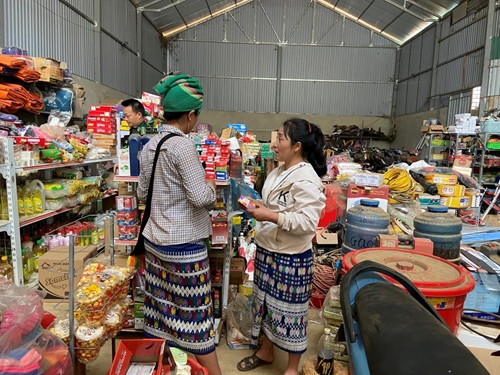Since then, the living standards of the two sides’ people have improved while political security and social order have been ensured, together with the tightening of solidarity between the two peoples.
Solidarity in Lao Kho 1 hamlet
Lao Kho I hamlet and the two Lao communes of Keo Lom and Na Khang have enjoyed close-knit solidarity for a long time. The people here always bear in mind that 70 years ago, Lao former State President Kaysone Phomvihane used to work as a secretary in La Kho 1 hamlet to make preparations for the building of a revolutionary base in Viengxay, Laos. The Lao revolutionary force had received wholehearted support from the Vietnamese side, including Mr. Trang Lao Kho’s family. Since then, the friendship and solidarity between local people in Lao Ko 1 hamlet and the Lao people have been cultivated over time.
    |
 |
|
Lao people buying necessities from the Vietnamese traders |
Head of Lao Kho 1 hamlet Trang Lao Minh held that they always consider local residents in Phieng Sa their relatives and are willing to help them in any circumstances. Over the past time, the two sides have attached much importance to boosting the bilateral solidarity cultivated through generations.
In addition, bilateral trade between the two sides has also developed. Accordingly, Lao people sell their agricultural products in Vietnam and buy necessities from the Vietnamese traders. “Knowing that the locals in Lao Kho 1 make money from plum planting, some of Lao people also planted plum and received support and instruction from their Vietnamese peers,” Minh added.
Together developing socio-economy
Since 2015, people living along the shared borderline between Phieng Khoai commune and Lao Phieng Sa residential area have twinned, in which Lao Kho 1 twinned with Laos’ Na Khang and Bo Sinh hamlets, Lao Kho 2 twinned with Laos’ Pha Long hamlet, and Keo Muong twinned with Laos’ Keo Lom hamlet.
Annually, the pairs of hamlets review their coordination program. During the lunar New Year of Vietnam and the Lao traditional New Year festival, they visit and extend greetings to each other and organize cultural and sports exchange activities. Besides, they are also willing to help each other whenever needed and share experience in management and leadership.
According to Chairman of Phieng Khoai commune People’s Committee Dang Van Cuong, implementing policies on external affairs and investment cooperation of the Party and State, over the past years, both sides have created favorable conditions for enterprises and individuals to invest in road construction, and provide agricultural materials and seedlings with high economic benefits, among others.
So far, in Phieng Khoai commune, there are ten households investing in and purchasing agricultural products in the hamlets of Na Khang, Phieng Xa, Keo Lom, Pha Long, Co Hay, and Keo Dieng...
The twinning hamlets regularly meet with each other to share experience so as to promote production and raise the living quality of border people in the areas.
Meanwhile, they have also focused on the spiritual lives of the people living along the borderlines through activities to preserve and promote traditional cultural identities of each country, and eliminate unsound customs.
...and ensuring border security
In addition to socio-economic development, people of the twinning hamlets also join hands to ensure security in the border areas. Accordingly, they often share information about situations along the borderline of mutual concern, closely work with each other to address any arising issues in the areas, and create favorable conditions for both sides to cross the border to visit their relatives, and purchase goods serving their daily lives, to name but a few.
Especially, amid the complicated developments of the COVID-19 pandemic, the Phieng Khoai commune’s authorities directed the border hamlets to work with the authorities of Phieng Sa residential area to strictly manage border areas to prevent illegal border crossings, so as to curb the spread of the pandemic in the area.
Mr. Dang Van Cuong held that the twining activities have helped raise the locals’ awareness of their responsibility towards national sovereignty and border security, thereby strictly following all regulations related to the Vietnam - Laos borderline, contributing to maintaining political stability in border areas, meeting the requirements of socio-economic and cultural development, eradicating hunger and poverty, and improving people’s living standards.
Source: Baobienphong
Translated by Minh Anh